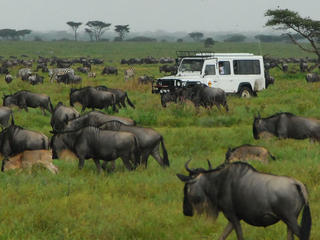 |
| Ernest Hemingway on a successful hunt. Image credit: Wikipedia Commons. |
In Africa, one of the biggest enemies to animal conservation is trophy hunting. This is close to, but not to be confused with, poaching, or the illegal killing and harvesting of animals. Instead of being hunted off of preserves and wildlife areas, trophy animals are usually killed legally on private plots of land reserved just for this purpose. Hunters worldwide pay thousands of dollars to fly in and kill the majestic 'beast' of their dreams, all for a the thrill and experience.
Luckily, trophy hunting is often frowned upon by African governments, such as South Africa, which has banned it from its 22 national parks. However, it is not illegal, and the profits made off of trophy hunting on private game parks in South Africa make up a large chunk of the $280 million a year made off of wildlife tourism, an even larger chunk than eco-tourism. This is a negative trend, as it encourages the needless killing of one of Africa's most important features: it's wildlife. In South Africa, 54,000 animals were killed by 6,700 tourists in 2003-2004 hunting season (Tsui).
And even if hunting can be condoned as a viable sport, trophy hunting is completely rigged and unethical. The animals are trained to be comfortable with humans. The animals are often drugged or incapacitated or their range of movement is limited. They are killed with powerful rifles and bows that their natural features could never guard against. What is more, they are often outnumbered and shot from a jeeps or even helicopters. Some even approach the hunter curiously before being shot in the head. Perhaps the only way trophy hunting could be remotely ethical is if the hunter was required to get buck naked and kill the animal with his or her own bare hands or a weapon made using his or her own skills in the wild.
| A wall-mounted Cape Buffalo head. Image credit: Lord Mountbatten, Wikipedia Commons. |
Here is an example of a pay-to-order, package-based, trophy hunting vacation outfit:
http://www.africanskyhunting.co.za/trophy-hunting.html
African Sky Hunting, stationed in South Africa and Zimbabwe, offers hunters the ability to pay for their own "hunting packages." For instance, one could buy the "5-Day Beginner's Package," which includes one Blue Wildebeest, one Impala, and one Blesbok. But that's not all. The hunting fanatic could purchase a $78,675, "21 Day Lion, Buffalo, & Elephant" package, which offers one Lion, one Cape Buffalo, one Elephant, one Kudu, one Blue Wildebeest, and one Zebra. Each package shows a picture of a happy tourist crouching over a dead animal, content with his or her violent accomplishment.
A powerful anti-trophy hunting video:
https://www.youtube.com/watch?v=rcuDILOo6x4&oref=https%3A%2F%2Fwww.youtube.com%2Fwatch%3Fv%3DrcuDILOo6x4&has_verified=1
 |
| The heavily hunted Cape Buffalo. Image credit: Leonara Enking, Flickr. |
References:




